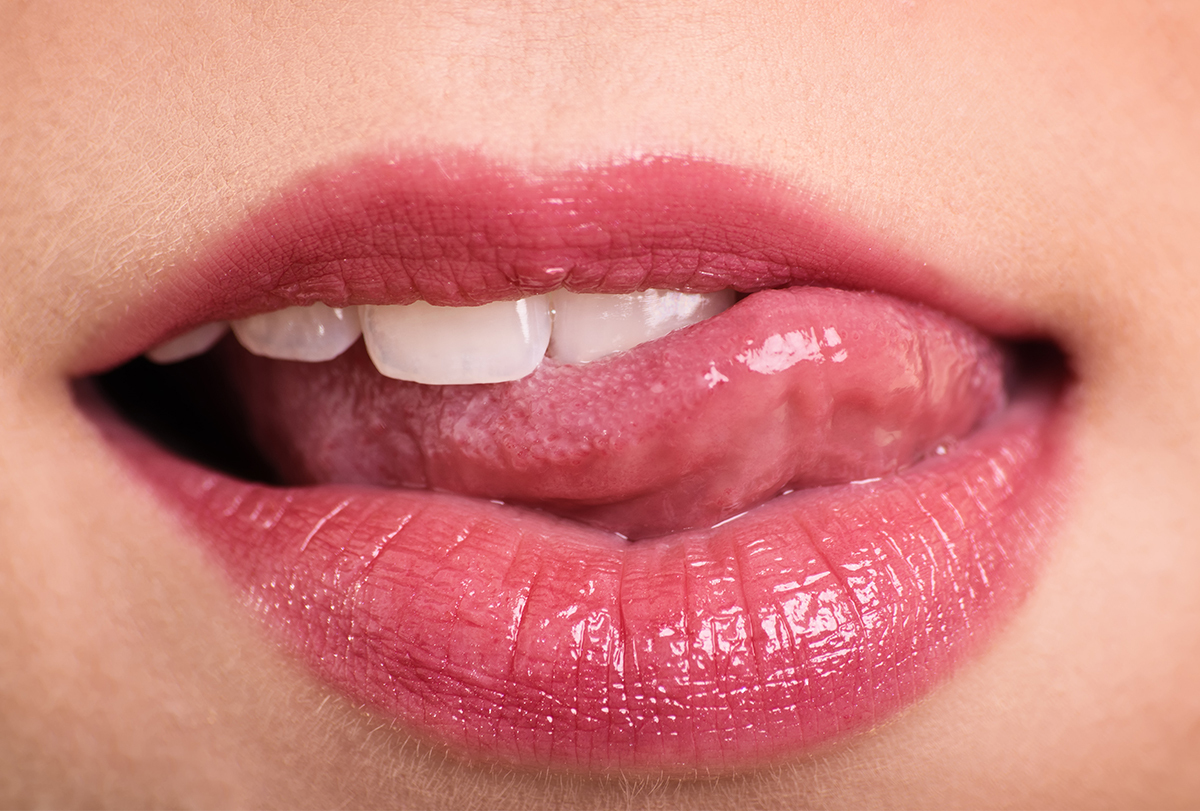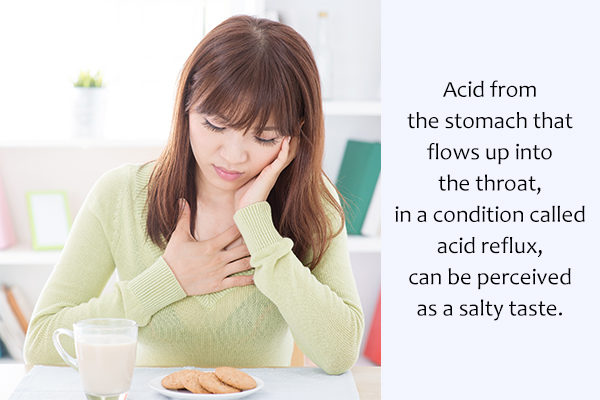In this article:
A salty taste in the mouth is usually one that is similar to sodium chloride, or common table salt. Other elements can also elicit a salty taste sensation.

The salty taste can be accompanied by bitterness, sourness, or acidity. (1) The taste can also be described as metallic.
Mechanism Behind the Sense of Taste
The tongue is the main organ used for taste and has different cells to identify each of the five basic tastes – sweet, sour, bitter, salty, and umami (savory flavor associated with broths, soy sauces, and mushrooms). (2) These cells are also present at the back of the throat, in the nasal cavity, and in the esophagus.
- The surface of the tongue is coated with tiny bumps called papillae, which contain taste buds within them.
- A narrow passage called the taste pore connects the taste bud to the surface of the tongue.
- Three to five tiny projections enter this pore from each taste cell in the taste bud and are known to be stimulated by substances that are ingested.
- Saliva and tongue movement pushes the ingested food into the grooves of the tongue and finally into the taste buds.
- The chemical substances that give the food its taste stimulate the small nerves present inside the taste bud, which then activate the main nerves involved in conducting taste, i.e., the lingual, glossopharyngeal, and vagus nerves.
- The main nerves pass the information regarding the flavor to the brain.
- About half of the sensory cells in the taste buds react to the five basic tastes. Each cell has its own sensitivity scale. A cell may be more reactive to salty, followed by sour. Another may be more reactive to umami, followed by sweet.
- The other half of the sensory cells and small nerves are specialized and only react to one taste. Their job is to transmit the intensity of the flavor.
- The full taste profile of something is experienced after all the sensory information from different parts of the tongue is combined.
- This information is also combined with the temperature, aroma, and texture of the product that is ingested.
All of this information makes for a wide variety of possible flavor experiences. (3)
What Causes a Salty Taste in the Mouth?

A salty taste in the mouth can be due to several causes:
- An obvious cause behind having a salty taste in the mouth is eating salty foods. The human body needs to have a certain amount of sodium from salt to sustain various life functions, but excessive intake can increase blood pressure and cardiovascular risk and invite other health problems. (3)(4)
- A salty or metallic taste in the mouth can also be a sign of bleeding gums caused by periodontal disease, pregnancy-related hormonal fluctuations, using a hard-bristled toothbrush, eating sharp or solid foods, and other gum injuries.
- Salty taste can be a side effect of dry mouth caused by certain medications, tobacco use, and cancer treatment, among other reasons.
- Vomiting or bouts of diarrhea can cause dehydration, which leads to intense thirst, tiredness, and a salty taste in the mouth.
- Allergies or a postnasal drip that enables mucus from the nose to drip into the throat can cause a salty taste.
- Acid from the stomach that flows up into the throat, in a condition called acid reflux, can be perceived as a salty taste.
- An autoimmune disorder called Sjogren’s syndrome can lead to drying up of the salivary glands, rendering your mouth increasingly dry and altering your taste perception. (5)
- The hormonal changes related to menopause can induce a salty or metallic taste in the mouth. (2)(6)
- Damage to any of the nerves or parts of the brain associated with taste can cause a salty sensation in the mouth.
- Some denture adhesives used to keep dentures from slipping can cause a salty taste in the mouth.
Medical Treatment to Relieve a Salty Taste in the Mouth

The medical treatment options depend on the cause of the salty taste.
- A diet low in salt and adequate hydration with caffeine-free drinks are helpful. Dehydration can become a serious problem. In addition to a salty taste, extreme thirst can be experienced along with dark urine or a complete stoppage of urination. The patient can become very confused, tired, and dizzy. Seizures, heat exhaustion, and kidney issues can occur.
- If simply drinking liquids does not improve the symptoms, hospitalization will be necessary. The hospital will administer intravenous fluids and electrolytes to restore fluid and mineral balance.
- Bleeding gums signal the beginnings of periodontal disease. A study found that a rinse of chlorhexidine gluconate effectively killed the bacteria in the mouth that are related to gum disease. In addition to killing bacteria, the rinse also reduced the intensity of a salty taste. (7)
- If the salty taste is due to a medicine you are taking, your physician may be able to switch a medication to another effective one to alleviate the salty taste.
- Over-the-counter rinses, sprays, and lozenges are available to increase moisture in your mouth. These may be used to counteract a salty taste.
- Antihistamines may be used to counteract the postnasal drip from allergies.
- Antacids can be used for a salty taste in the mouth due to reflux.
Note: Always consult your healthcare provider before trying any remedy for the salty taste in your mouth, especially if you have a preexisting medical condition.
Diagnosing the Cause
The root cause behind the salty taste in your mouth can be diagnosed through the following ways:
- If you have been eating a lot of salty foods, such as chips, pickles, pretzels, and processed foods, and have a salty taste in the mouth, you would be able to realize it yourself and lower your salt intake.
- Your dentist can help diagnose bleeding gums or periodontal disease through a clinical examination and radiographs. Your dentist can also recommend a different denture adhesive.
- Many medications can cause dry mouth and a salty taste. Ask your physician if your medication may be the cause.
- Cancer treatment, especially radiation to the head and neck, can disable the salivary glands, resulting in a lack of saliva and a salty taste. Check with your oncology team if you experience such symptoms.
- A bout of food poisoning or even exercising can cause dehydration and a salty taste. If hydrating does not relieve the taste, your doctor may be able to identify the cause with an exam and questions.
- Your physician will review your medical history, perform a physical exam, and order blood tests to identify any other cause such as allergy, postnasal drip, acid reflux, or Sjogren’s syndrome.
- You may be referred to a neurologist who may order additional brain scans if brain injury or nerve damage is suspected.
Are There Any Home Remedies That May Provide Relief From a Salty Taste in the Mouth?
Maintain adequate hydration, brush and floss your teeth thoroughly, rinse with products designed to restore moisture in the mouth and kill bacteria, and look into the side effects of the medication you are taking.
Manage allergies with antihistamines and possibly a humidifier. Eat less salty food. Switch denture adhesives if necessary. See your doctor if home remedies do not work.
Potential Complications
One complication of having a salty taste in the mouth is not getting proper nutrition because eating is not enjoyed.
Conditions that affect the brain and nerves can affect the tongue and cause a salty taste. A tumor or multiple sclerosis can cause a salty taste and must be treated. Ignoring a change in taste without knowing the cause could result in a worsening of the condition.
When to See a Doctor
If a salty taste in the mouth persists and the reason for it is not known, see a physician or dentist.
Final Word
A well-functioning sense of taste is a sign of good health and vice versa. In some cases, the abnormal flavor in your mouth may be a temporary glitch caused by eating too much strong-tasting foods, but it can be a concern if it becomes a prolonged or frequent occurrence.
You can overcome the salty taste in your mouth by staying hydrated and limiting your sodium intake. If the condition persists despite preliminary self-care, consult a medical or dental professional to rule out any serious underlying issue and address the source of the problem through proper treatment.
- Was this article helpful?
- YES, THANKS!NOT REALLY


